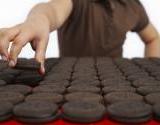Main Menu
Our brain makes us eat the chocolate!
Thousands of women will be thrilled to hear it’s not their fault: a recent brain study suggests an opium-like chemical may drive the urge to gorge on chocolate and other fatty or sweet treats.
Chemicals are triggered that make us want more
When rats were given an artificial boost with a drug that went straight to a brain region called the neostriatum, it caused the animals to eat twice as much M&Ms as they would have eaten otherwise. They also discovered that when the rats started gorging themselves, there was a surge in enkephalin, a natural opium-like substance produced in the same region of the brain.
Similar to an opioid signal
“Here, we provide evidence that enkephalin surges in an anteromedial quadrant of dorsal neostriatum contribute to generating intense consumption of palatable food,” according to the report. “These findings reveal that opioid signals in anteromedial dorsal neostriatum are able to code and cause motivation to consume sensory reward.” Translation: eating chocolate makes us eat more chocolate.
Key to addiction and overconsumption
“This means that the brain has more extensive systems to make individuals want to overconsume rewards than previously thought,” said Aexandra DiFeliceantonio of the University of Michigan. “It may be one reason why overconsumption is a problem today.”
Until now, no one knew this part of the brain had this function. “The same brain area we tested here is active when obese people see foods and when drug addicts see drug scenes,” explained DiFeliceantonio. “It seems likely that our enkephalin findings in rats mean that this neurotransmitter may drive some forms of overconsumption and addiction in people.”
Source: MedicalNewsToday, Current Biology
This information is solely for informational and educational purposes only. The publication of this information does not constitute the practice of medicine, family planning, child psychology, marriage counseling and this information does not replace the advice of your physician or other health care or mental health care provider. Neither the owners or employees of NaturalFamilyOnline.com or the author(s) of site content take responsibility for any possible consequences from any treatment, procedure, exercise, dietary modification, application of medication or any other action involving the care of yourself or any family members which results from reading this site. It is always best to speak with your primary health care provider before engaging in any form of self treatment. Additional information contained in our Legal Statement


